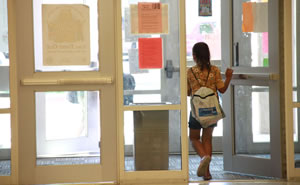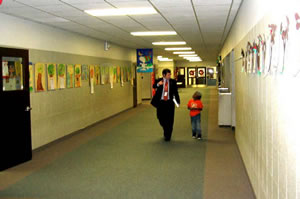Security Assessments: Truly Reducing the Risks

PHOTO COURTESY OF RACHEL WILSON, SAFE HAVENS INTERNATIONAL
The deadly shooting at Sandy Hook Elementary School in Newtown Connecticut has sparked thousands of school security assessments. While efforts to improve school security often yield positive results, hasty efforts sometimes fail to achieve desired outcomes and can in fact result in an actual reduction in school safety.
A properly conducted security assessment process will dramatically reduce the risks of serious injury and death while improving school climate. However, assessments conducted too hastily will result in the same serious mistakes that were so prevalent in the wake of similarly rushed security assessments following the Columbine High School attack. We are, unfortunately, again seeing some schools and districts dump millions of dollars into school security approaches that will prove to be ineffectual, unsustainable or, as we have seen in some instances, can actually contribute to the loss of human life.
This situation is occurring for two basic reasons: (1) some school officials and consultants do not understand the various aspects of school security that need to be assessed; and (2) many school organizations have moved too hastily and have selected vendors lacking substantive qualifications in conducting proper K-12 school security assessments. How can school officials ensure a viable assessment process?
Follow a holistic approach to security assessment
Unfortunately, many school security assessment projects are too heavily focused on physical school security measures without adequate attention to the human aspect of how schools operate. This approach has repeatedly proven to be ineffective in K-12 schools. A holistic approach to evaluating schools and school systems is needed, rather than an emphasis on locks, cameras, access control systems and other security technologies without attention to how people interact with one another.
Over the past decade, our analysts have consistently been able to defeat access controls systems at the request of our clients, and to enter schools and persuade children to take us on a tour of the school without being identified as a threat by school staff. More importantly, actual aggressors have also frequently been able to breach school security systems. Far from suggesting that school security technologies are ineffective, I respectfully suggest that they must be supported by a carefully developed culture of school security.
If reliability in school security is desired, the assessment of how people interact is at least as important as the assessment of the physical aspects of the school. Similarly, student supervision, safety and security practices, body language of the school, the connectivity between staff and students, and a host of other aspects of a school have as much of an impact on school violence as security technologies. When security technologies, policies and practices are combined with the creation of a positive culture of safety, much more reliable school security and emergency preparedness levels can be achieved.
For a truly effective security assessment of a K-12 school, we suggest the following be assessed:
- general security procedures and practices;
- student supervision;
- physical security technology;
- building design and features;
- school climate;
- culture of security;
- emergency preparedness policies and practices; and
- one-on-one simulations of school crisis situations to measure actual levels of preparedness.
The last item is of particular importance as gaps in how well rank-and-file staff will respond to a life-and-death emergency are one of our most promising avenues to reduce death in American schools. This approach is among the most effective ways to find and fix common and deadly gaps in school safety.
Conduct assessments when schools are in session
School security assessments that are conducted when school is not in session are of limited value. While there may sometimes be no other option, assessing empty schools will yield far less productive findings and can pose additional concerns if security-related litigation occurs. Observing student arrival and dismissal at representative schools often reveals some of the most dangerous hazards.
Due diligence in selection of vendors
Working as an expert witness consultant in school safety malpractice cases, my experience has been that retaining unqualified experts or firms to conduct assessments not only fails to reduce exposure to civil liability, but can actually increase exposure. In one case, a school district settled more than two dozen lawsuits after a number of deaths occurred. Though the security consulting firm the district retained also settled numerous lawsuits, which did nothing to reduce the liability exposure to the district.
School officials should remember that effective security approaches for K-12 schools are often vastly different than those that would be effective for banks, hotels, military installations and other types of facilities. Some firms with extensive experience in other settings may not be able to provide effective security advice for schools. School officials are well advised to focus on firms that have conducted assessments for at least 20 to 50 school clients. Independent schools, large urban school districts, charter schools or schools in remote areas should each look for firms with relevant expertise for their type of school. There are dozens of firms that have extensive experience that is specific to the K-12 arena. Remember, that you must conduct due diligence and be prepared to prove in a court of law that the firm you select is properly qualified to conduct assessments for K-12 schools.

PHOTO COURTESY OF SAFE HAVENS INTERNATIONAL
Pay attention to costs
High costs in school security assessment work do not always result in high quality. Having worked in a government school safety center and for a non-profit school safety center, I have been continually amazed to see school districts pay $10,000 to $15,000 or even more per building for security assessments conducted by the vendors, when far more qualified firms will conduct more comprehensive assessments for a fraction of these costs. A competitive and well-circulated bid process will help school officials get the most value for the lowest cost.
Special considerations for written reports
School officials should insist that they are afforded the opportunity to fact-check written reports before the report is finalized. Any reputable firm can provide an external evaluation with integrity while allowing the client an opportunity to fact check the draft report for accuracy. Just as an attorney in a federal civil action can, and typically will, review the draft report of an independent expert witness, school officials should insist they be afforded this opportunity so they are not stuck with an erroneous or unclear report. As with a reputable expert witness, a quality consultant will not change factual findings due to pressure from the client. If your consultant or firm cannot defend their integrity if someone alleges that they have been pressured by the client to change their finding, they likely not be able to defend their viability as school safety experts in a court of law if you are litigated.
Acting on findings and opportunities for consideration
While there are many instances where it is appropriate not to implement a recommendation from an external security assessment, there should be sound reasons for doing so. Selecting a quality firm should help you avoid the trap of being saddled with impractical recommendations. Requesting and checking six to 10 school security assessment project references can help you identify firms that will remain focused on your needs.
Sustainable approaches to school security assessments
Finally, you should consider firms that will “teach you how to fish” rather than to “sell you fish”. Quality firms will not only allow, but encourage school employees as well as public safety officials to accompany their staff during assessments. Some firms also train your personnel in the process as part of the project. Reputable firms will also avoid trying to “up sell” you by continually listing services they provide in their report of findings. While there are often instances where a firm can offer you valid services, such as training or consulting to help you correct gaps that have been identified, this should not be a focus of the report of findings.
Viable assessments are as simple as careful evaluation of service providers
Though we have focused on the most common traps we have seen, there are many reputable service providers who can conduct effective school safety and security assessments. The key lies in widely soliciting proposals, carefully evaluating the qualifications of firms with solid K-12 school experience and checking as many references as possible. The most qualified firms will appreciate you screening them carefully. After all, the closer you look, the better the most qualified firms will look.
About the Author
Michael Dorn serves as the executive director for Safe Havens International, Inc., an IRS-approved, nonprofit safety center. He has authored and co-authored more than 20 books on campus safety. He can be reached through the Safe Havens website at www.safehavensinternational.org.